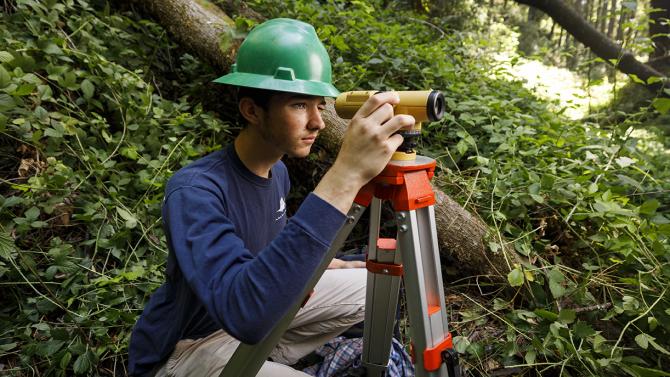Environmental Management and Protection
College of Agriculture, Food and Environmental Sciences
Environmental management and protection majors are concerned with protecting the environment and the sustainable management of natural resources while considering human impact, needs and goals.
San Luis Obispo, California
The curriculum emphasizes management and protection of ecosystem structures, as well as processes that sustain uses of environmental resources. It includes courses in biology, geology, forestry, environmental policy and law, sustainable agriculture, climate change science and more.
Ecology and Habitat Management
Tackle the fundamentals of resource ecology and humanity's role as the principal factor of change of resources in natural systems. Learn about the importance of maintaining the natural dynamics of energy flow and nutrient cycles at the community and ecosystem level to sustain uses and values.
Introduction to GIS
Learn the fundamental concepts of Geographic Information Systems (GIS) using ArcGIS platform. Create, manage, analyze and display geographically referenced data and explore how GIS is applied to analyze environmental, social and natural resource issues.
Introductory Soil Science
Investigate the biological, chemical, physical and genetic properties of soils and learn how to interpret soils data to make environmental decisions, apply management practices and encourage sustainable food production.
Watershed Management and Hydrology
The watershed management and hydrology concentration provides a focused and encompassing program in watershed management. You will gain proficiency in watershed hydrology in forest ecosystems, Mediterranean ecosystems, rangeland hydrology, post-fire watershed evaluation, watershed and stream restoration, and urban/wildland hydrologic implications. By pursuing this concentration, you can qualify as a hydrologist under the U.S. Office of Personnel Management guidelines.
Wildlife Biology Concentration
The wildlife biology concentration prepares you for wildlife biology certification and employment in the fish and wildlife areas of law enforcement, management, and production. Additional classes can be taken in: climate change science, environmental mitigation strategies, environmental policy and management, environmental soil science, forest and environmental practices, geology, geospatial technology, sustainable agriculture and urban forestry.
About the Program
A degree in environmental management and protection provides you with the science and management background to protect environmental values and the sustainable consumption of natural resources while achieving human goals.
You will gain knowledge of the legal and regulatory environment as well as the ecological and economic theories to use while solving conflicts over environmental uses and impacts. The major is endorsed and supported by the California Association of Environmental Professionals (AEP). You can choose between a watershed management and hydrology or wildlife biology concentration, or remain on a more general program. You will learn to effectively communicate, work in teams, develop leadership skills and exhibit an understanding of ethics and sustainability principles. All areas will culminate with a guided research project or internship focusing on a specific area of environmental science.
Learn by Doing
Environmental management and protection majors have access to diverse faculty and laboratories across campus as well as the diverse ecosystems of California's Central Coast, including the 3,200 acre Swanton Pacific Ranch. Your labs and field trips take you into the forest to study the impact of insects and diseases or into the hills to evaluate soil erosion and sediment control to prevent mudslides. You will learn how to use land and resource measurement technology and methods as well as how to estimate and assess the environmental impacts of human activity. Through the department and related clubs, you can participate in informational programs and projects, as well as network for jobs and internships.

Survey the Forest
Our Graduates
Graduates are prepared for a broad range of professional careers in environmental assessment, impact analysis, project management, and impact mitigation monitoring.
Employers range from private business and industries that provide consulting services to government agencies and nonprofit organizations.
